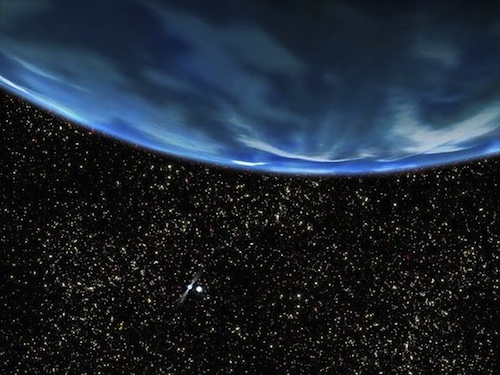We might be. We (“we” as in the human race) just discovered the farthest galaxy ever. It has the sexy name of “z8_GND_5296,” and is about 30 billion light years from Earth (hard to wrap your head around that). It appears to us, via telescope, as it was 13.1 billion years ago because the universe is actually expanding. We can go down a pretty deep wormhole of science here, and I’d probably confuse myself even more than anyone reading this, but the point is … it’s very far away, but it’s not the edge of the universe, i.e. the first stars. But … we might be close to that.
In that BBC article, Professor Alfonso Aragon-Salamanca from the University of Nottingham notes that “the further away we go, the closer we will get to discovering the very first stars that ever formed in the Universe. The next generation of telescopes will make this possible.”
Specifically, he may be referring to the James Webb Space Telescope, which is now on track to finish at about $8 billion.
The telescope should go live in 2018, and theoretically can connect the Big Bang to the Milky Way Galaxy. If you’re really into the notion of this telescope, you can actually watch it being built live.
I wasn’t really sure as I started looking for context on all this stuff whether the Big Bang is accepted scientific theory — it is, apparently, and quite widely accepted — and to be honest, I didn’t understand it worth about two-three shits. This is a decent summary page. The Wiki for Big Bang is actually fairly complicated, although I did learn about the Planck epoch, which is essentially the first seconds of the universe’s history. It’s kind of interesting to think about something emerging from nothing, which doesn’t seem logical to us, but apparently happened (let’s not bring religion into this right now, although I do have beliefs there too).
Final cool thing about the James Webb: it should have the potential to see Earth-like worlds. I personally can’t believe that we’re alone in the universe; there’s probably other worlds somewhere with something closely approximating human life. It would be cool to know, although travel might be a legitimate issue, because I don’t think it’s really as easy as it is for these guys:
